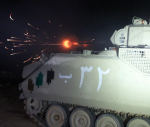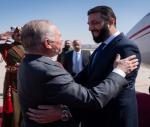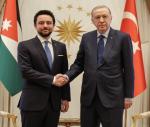You are here
Lebanon and Iraq: Charting new paths in changing regional context
Jan 12,2025 - Last updated at Jan 12,2025
The resolution of Lebanon’s presidential election emerged as a direct outcome of the recent war in Lebanon, a development that has essentially unfolded in the post-October 7 context. Without this war and its consequences, such a breakthrough would not have occurred in its current form. Central to this development is the speech delivered by Joseph Aoun, a figure celebrated internationally, which underscored critical points shaping Lebanon’s upcoming political path and outlined the immense challenges the country faces.
Key among these points is consolidating arms under state control, limiting the responsibility of confronting Israel to the Lebanese Army, and imposing control over Palestinian camps. These indicators reflect a profound shift in Lebanese policy. According to Aoun, Lebanon might be on the verge of implementing these changes, including combating smuggling, dismantling mafia networks, and addressing money laundering.
Backed by international support, this new framework, coupled with the presence of a new president, positions Lebanon closer than ever to a system of international oversight, enhanced by significant Arab involvement, particularly from Saudi Arabia. Riyadh, after years of political distancing from Lebanon, is now re-engaging diplomatically, extending its influence from Syria to Lebanon.
On the Iraqi front, Prime Minister Mohammed Shia al-Sudani recognizes the urgent need for similar measures to integrate militias and eliminate arms outside the framework of the state’s military. His recent visit to Iran and meeting with Supreme Leader Ali Khamenei highlighted this issue as a top priority. Al-Sudani’s direct request for Iran’s assistance, particularly regarding groups like Kataib Hizbollah and Harakat al-Nujaba, underscores his understanding that success in this endeavour is essential to shielding Iraq from direct security threats in the coming weeks
Al-Sudani is acutely aware that Israel might redirect its security efforts toward "non-geographically adjacent threat fronts," such as Yemen, Iraq, and even Iran. This development places Iraq among the key focal points for potential confrontations, bringing heightened challenges for the region.
Meanwhile, Jordan has begun adapting to shifting regional dynamics by embracing pragmatic policies, as demonstrated by the recent visit of a Syrian government delegation to Amman. This step reflects a strategy grounded in realism to navigate ongoing developments. However, Jordan’s approach also necessitates closely monitoring southern Syria, especially the areas bordering Jordan, due to continuous activity in this region.
The struggle over Daraa’s geography has expanded beyond military influence to include control over drug trafficking routes, making the area a battleground for multiple parties, including local militias, remnants of the Syrian regime, and groups affiliated with Daesg. In addressing the issues in Syria, Jordan must look beyond a purely security-centric approach. A broader perspective that incorporates comprehensive, actionable political solutions is essential. This does not mean interfering in Syrian affairs but rather working toward practical resolutions for enduring issues, particularly those concerning the Kurdish and Druze communities.
The coming weeks are likely to be marked by escalations, as securing Israel’s borders takes on new dimensions, especially as an incoming Trump administration looms. The broader goal of eliminating militias and arms outside state control in the region remains paramount, but achieving this goal will require navigating significant hurdles. The resulting security implications will continue to shape the region’s dynamics, presenting substantial challenges for the foreseeable future.














Add new comment